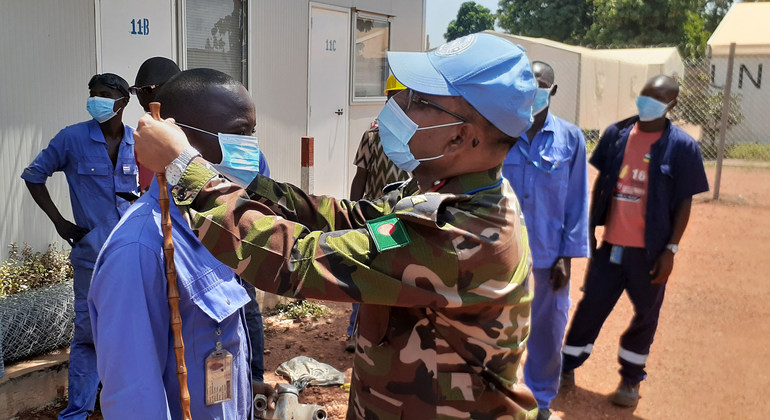“The health pandemic has fast become a protection crisis”, António Guterres warned. With more than one billion children out of school, 135 million people facing starvation by year-end, and healthcare workers routinely being targeted by violence, “these wide-ranging risks require an urgent and united response.”
The high-level debate, convened by Germany as president for July, follows the Council’s passage on Wednesday of resolution 2532 (2020), which demands a general and immediate cessation of hostilities in all situations on its agenda.
The health pandemic has fast become a protection crisis…these wide-ranging risks require an urgent and united response – UN Secretary-General
Trust eroded
The risks are diverse, the UN chief said. Trust in public institutions is being eroded in places where people perceive that authorities have not addressed the pandemic effectively or have not been transparent about its impact. As grievances become more entrenched, the potential for instability and violence only grows.
In some places, fragile peace processes could be derailed if the international community is distracted, he said. In Sudan’s restive Darfur region, the pandemic has led to repeated extensions of the deadline for completing the Juba peace process.
Elsewhere, he said terrorist and violent extremist groups see the uncertainty created by the pandemic as a tactical advantage. In Somalia, there is a risk that Islamist extremist group Al-Shabaab, could increase its attacks while security forces, by necessity, focus on the pandemic.
COVID and the vote
Many countries have had to consider how to move ahead with elections slated for 2020 while trying to manage the health crisis. In the Central African Republic, attempts to use the pandemic as a pretext to postpone elections planned for year-end are creating tensions.
Collective security and a shared wellbeing are under assault on many fronts, led by a relentless disease and abetted by global fragilities. “Our challenge is to save lives today while buttressing the pillars of security for tomorrow,” he said, expressing his support for the Council in any way possible as it carries out its essential part of the response.
Needs are vast, growing
Peter Maurer, President of the International Committee of the Red Cross (ICRC), said his organization sees first-hand how COVID-19 is deepening fragility, spiking humanitarian needs, accelerating the impact of violence in conflict and reversing hard-won development gains.
It is clear that pandemics cannot be addressed only as a health issue.
Health care at gunpoint ‘futile’
Sharing lessons for humanitarian response, he said international humanitarian law must be respected in order to protect civilians from pandemics. Countries where health services are destroyed, stand little chance of fighting COVID-19.
Healthcare workers – the first and last lines of defence – must be protected, he said, stressing that resolution 2286 (2016) will be “fruitless” if it does not result in meaningful behaviour change on the ground.
Assistance and protection must be available to all those in need without threat of intimidation or manipulation. “People’s needs are the only reasonable basis on which to respond”, he insisted, and he called for the development of a “people’s vaccine” that will be equitably distributed to everyone.
Further, he said the secondary impacts of the pandemic must be mitigated through the creation of safety nets and livelihoods, and that humanitarian responses must reach the most vulnerable, as failure to do so will only nurture the cycle of exclusion.
States also must guard against any rollback of civilian protections. Exceptional measures taken to fight the coronavirus must be time-bound and proportional to public health needs. Overall, he said, responses will only be effective if there is community trust and engagement. “Health care at gunpoint is futile”.
Broad understanding of peace, security
Heiko Maas, Germany’s Federal Minister for Foreign Affairs, underscored the urgent need for rapid and safe humanitarian access during the COVID-19 pandemic. “The Council must finally embrace a broader understanding of peace and security” he said.
While the UN’s founders may well have had artillery batteries in mind when they drafted the Organization’s charter, “today, we know a virus can be more deadly than a gun”, he said. Today, climate change affects more people than conventional weapons. “Closing our eyes to this reality means refusing to learn.”
The United Nations must be equipped with effective capacities. While resolution 2532 (2020) was “long overdue”, the Council nonetheless sent a sign of unity by endorsing the Secretary-General’s call for a global ceasefire. “This is what maintaining peace and security means in the twenty-first century,” he observed.




